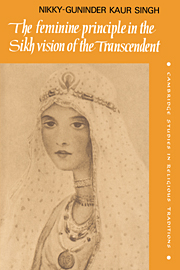Book contents
- Frontmatter
- Contents
- Preface
- Introduction
- 1 The Primal Paradox: seeing the Transcendent
- 2 Mother: the Infinite Matrix
- 3 The bride seeks her Groom: an epiphany of interconnections
- 4 Durgā recalled: transition from mythos to ethos
- 5 The maiden weaves: garlands of songs and waves
- 6 The woman asks: “What is life?”
- 7 Suṅdarī: the paradigm of Sikh ethics
- 8 Rāṇī Rāj Kaur: the mystical journey
- Conclusion
- Epilogue
- Notes
- Bibliography
- Index
1 - The Primal Paradox: seeing the Transcendent
Published online by Cambridge University Press: 07 October 2009
- Frontmatter
- Contents
- Preface
- Introduction
- 1 The Primal Paradox: seeing the Transcendent
- 2 Mother: the Infinite Matrix
- 3 The bride seeks her Groom: an epiphany of interconnections
- 4 Durgā recalled: transition from mythos to ethos
- 5 The maiden weaves: garlands of songs and waves
- 6 The woman asks: “What is life?”
- 7 Suṅdarī: the paradigm of Sikh ethics
- 8 Rāṇī Rāj Kaur: the mystical journey
- Conclusion
- Epilogue
- Notes
- Bibliography
- Index
Summary
bāṇī gurū gurū hai bāṇī
vicu bāṇī amrit sare.
bānī is the Gurū, the Gurū bānī
Within bāṇī lie all elixirs.
The genesis of the Sikh religion can be traced to Gurū Nānak's seeing of the Transcendent. That epiphanic moment in Sikh history discloses what I would term a thealogical vision. It anticipates modern feminist concerns about the reconciliation of polarities which shatter the binary oppositions manipulated by the theological vision of ultimate reality; it proscribes all forms of idolatry; it generates a new ideal with a strong commitment to social change; and its inspired poetic syntax promotes a shift from an androcentric to a feminist construction of the cosmos in a new and liberating relationship between the human and the divine. In turn, a reseeing of Gurū Nānak's vision could be a mode of empowerment for many of us of the “Second Sex.”
Gurū Nānak was born in ad 1469 at Talvaṇḍī, a small village about fifty miles southwest of Lahore in the Punjab. The Punjab was then part of the Lodi empire, and the formative years of Nānak's life coincided with the relatively stable period of Bāhlol Khān (1451–88). Nānak's father, Kalyān Cand (Kālū, for short), belonged to the Bedī clan of the Kśatriyas. As the village accountant, he kept rent records of the estate of the local Muslim landlord, Rāi Bulār.
The birth and life stories of Gurū Nānak coming down the generations form a distinctive genre called Janamsākhīs.
- Type
- Chapter
- Information
- Publisher: Cambridge University PressPrint publication year: 1993



